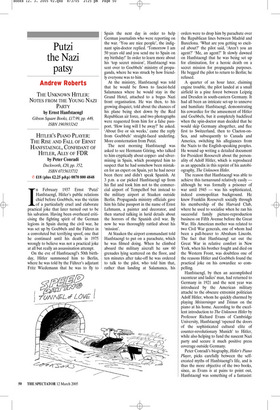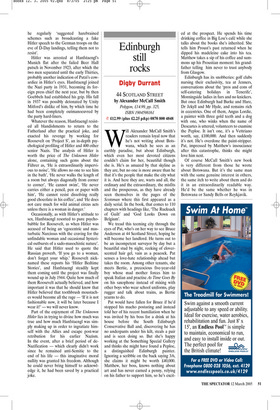Putzi the Nazi patsy
Andrew Roberts
THE UNKNOWN HITLER: NOTES FROM THE YOUNG NAZI PARTY by Ernst Hanfstaengl Gibson Square Books, £17.99, pp. 449, ISBN 1903933242 HITLER’S PIANO PLAYER: THE RISE AND FALL OF ERNST HANFSTAENGL, CONFIDANT OF HITLER, ALLY OF FDR by Peter Conradi Duckworth, £20, pp. 352, ISBN 0715633732 ✆ £18 (plus £2.25 p&p) 0870 800 4848 In February 1937 Ernst ‘Putzi’ Hanfstaengl, Hitler’s public relations chief before Goebbels, was the victim of a particularly cruel and elaborate practical joke that later turned out to be his salvation. Having been overheard criticising the fighting spirit of the German legions in Spain during the civil war, he was set up by Goebbels and the Führer in a convoluted but terrifying spoof, one that he continued until his death in 1975 wrongly to believe was not a practical joke at all but really an assassination attempt.
On the eve of Hanfstaengl’s 50th birthday, Hitler summoned him to Berlin, where he was told by the Führer’s adjutant Fritz Wiedemann that he was to fly to Spain the next day in order to help German journalists who were reporting on the war. ‘You are nice people’, the indignant spin-doctor replied. ‘Tomorrow I am 50 years old and you send me to Spain on my birthday!’ In order to learn more about his ‘top secret mission’, Hanfstaengl was sent over to Goebbels’ ministry of propaganda, where he was struck by how friendly everyone was to him.
At the ministry, Hanfstaengl was told that he would be flown to fascist-held Salamanca where he would stay in the Grand Hotel, attached to a bogus Nazi front organisation. He was then, to his growing disquiet, told about the chances of his plane being shot down by the Red Republican air force, and two photographs were requested from him for a false passport. ‘How long will I be away?’ he asked. ‘About five or six weeks,’ came the reply from Goebbels’ straight-faced underling. More consternation from Putzi.
The next morning Hanfstaengl was asked to see Hermann Göring, who talked to him cryptically about copperand silvermining in Spain, which prompted him to suspect that he had somehow been mistaken for an expert on Spain, yet he had never been there and didn’t speak Spanish. At 3 p.m. a car picked Hanfstaengl up from his flat and took him not to the commercial airport of Tempelhof but instead to the military airport at Staaken outside Berlin. Propaganda ministry officials gave him his false passport in the name of Ernst Lehmann, a painter and decorator, and then started talking in lurid details about the horrors of the Spanish civil war. By now he was thoroughly rattled about his ‘mission’.
At Staaken the airport commandant told Hanfstaengl to put on a parachute, which he was filmed doing. When he climbed aboard the military aircraft he saw 60 grenades lying scattered on the floor, and ten minutes after take-off he was ordered to talk to the pilot, who told him that, rather than landing at Salamanca, his orders were to drop him by parachute over the Republican lines between Madrid and Barcelona. ‘What are you getting so excited about?’ the pilot said, ‘Aren’t you an agent?’ ‘Me, an agent?’ It slowly dawned on Hanfstaengl that he was being set up for elimination, for a heroic death on a secret mission for propaganda purposes. He begged the pilot to return to Berlin; he refused.
A quarter of an hour later, claiming engine trouble, the pilot landed at a small airfield in a pine forest between Leipzig and Dresden in south-eastern Germany. It had all been an intricate set-up to unnerve and humiliate Hanfstaengl, demonstrating his cowardice for the amusement of Hitler and Goebbels, but it completely backfired when the spin-doctor man decided that he would skip Germany altogether, and flee first to Switzerland, then to Clacton-onSea, and subsequently to Canada and America, switching his allegiances from the Nazis to the English-speaking peoples. He wound up writing a detailed document for President Roosevelt about the personality of Adolf Hitler, which is reproduced as an appendix in this reprint of his autobiography, The Unknown Hitler.
The reason that Hanfstaengl was able to achieve this turnaround relatively easily although he was formally a prisoner of war until 1945 — was his sophisticated, indeed cosmopolitan background. He knew Franklin Roosevelt socially through his membership of the Harvard Club, where he used to socialise when he ran his successful family picture-reproduction business on Fifth Avenue before the Great War. His American mother was related to two Civil War generals, one of whom had been a pall-bearer to Abraham Lincoln. The fact that Hanfstaengl sat out the Great War in relative comfort in New York, when his brother fought and died on the Western Front, was doubtless one of the reasons Hitler and Goebbels found the practical joke on his cowardice so compelling.
Hanfstaengl, by then an accomplished raconteur and ladies’ man, had returned to Germany in 1921 and the next year was introduced by the American military attaché to the obscure extremist politician Adolf Hitler, whom he quickly charmed by playing Meistersinger and Tristan on the piano at his home. According to the excellent introduction to The Unknown Hitler by Professor Richard Evans of Cambridge University, Hanfstaengl ‘opened the doors of the sophisticated cultural elite of counter-revolutionary Munich’ to Hitler, while also helping to fund the nascent Nazi party and secure it much positive press coverage outside Germany.
Peter Conradi’s biography, Hitler’s Piano Player, picks carefully between the selfcreated myths of Hanfstaengl’s life, and is thus the more objective of the two books, since, as Evans is at pains to point out, Hanfstaengl was something of a fantasist: he regularly ‘suggested harebrained schemes such as broadcasting a fake Hitler speech to the German troops on the eve of D-Day landings, telling them not to resist’.
Hitler was arrested at Hanfstaengl’s Munich flat after the failed Beer Hall putsch in November 1923, after which the two men separated until the early Thirties, probably another indication of Putzi’s cowardice in Hitler’s eyes. Hanfstaengl joined the Nazi party in 1931, becoming its foreign press chief the next year, but by then Goebbels had established his grip. His fall in 1937 was possibly detonated by Unity Mitford’s dislike of him, by which time he had been completely outmanoeuvred by the party hard-liners.
Whatever the reason, Hanfstaengl resisted all blandishments to return to the Fatherland after the practical joke, and exacted his revenge by working for Roosevelt on ‘Project S’, an in-depth psychological profiling of Hitler and 400 other senior Nazis. The analysis of Hitler is worth the price of The Unknown Hitler alone, containing such gems about the Führer as, ‘He is extraordinarily impervious to noise’, ‘He allows no one to see him in the bath’, ‘He never walks the length of a room but always diagonally from corner to corner’, ‘He cannot swim’, ‘He never carries either a pencil, pen or paper with him’, ‘He cannot resist dissolving really good chocolate in his coffee’, and ‘He does not care much for wild animal circus acts unless there is a woman in danger.’ Occasionally, as with Hitler’s attitude to sex, Hanfstaengl resorted to pure psychobabble for Roosevelt, as when Hitler was accused of being an ‘egocentric and masturbatic Narcissus with the craving for the unfindable woman and occasional hysterical outbursts of a sado-masochistic nature’. He said that Hitler used to quote the Russian proverb, ‘If you go to a woman, don’t forget your whip.’ Roosevelt nicknamed these reports his ‘Hitler Bedtime Stories’, and Hanfstaengl steadily kept them coming until the project was finally wound up in July 1944. Quite how much of them Roosevelt actually believed, and how important it was that he should know that Hitler believed that toothbrush moustaches would become all the rage — ‘If it is not fashionable now, it will be later because I wear it!’ — we will never know.
Part of the enjoyment of The Unknown Hitler lies in trying to divine how much was true and how much Hanfstaengl was simply making up in order to ingratiate himself with the Allies and escape post-war retribution for his earlier Nazism. In the event, after a brief period of deNazification — which clearly didn’t work since he remained anti-Semitic to the end of his life — this imaginative moral nullity was granted his freedom. Although he could never bring himself to acknowledge it, he had been saved by a practical joke.

































































 Previous page
Previous page